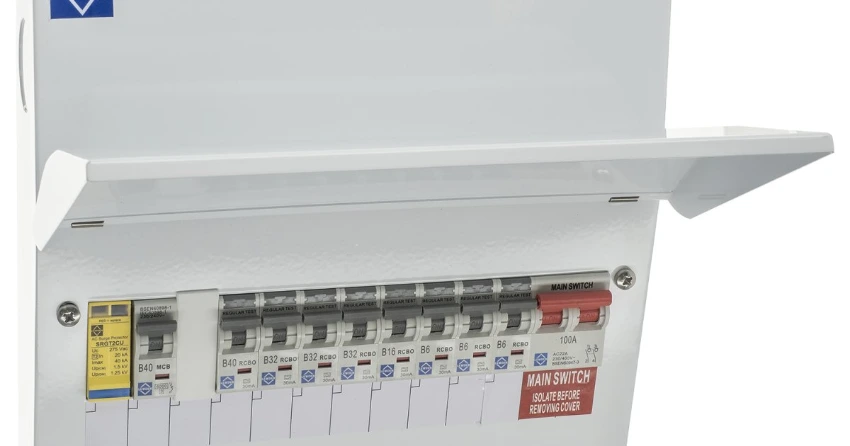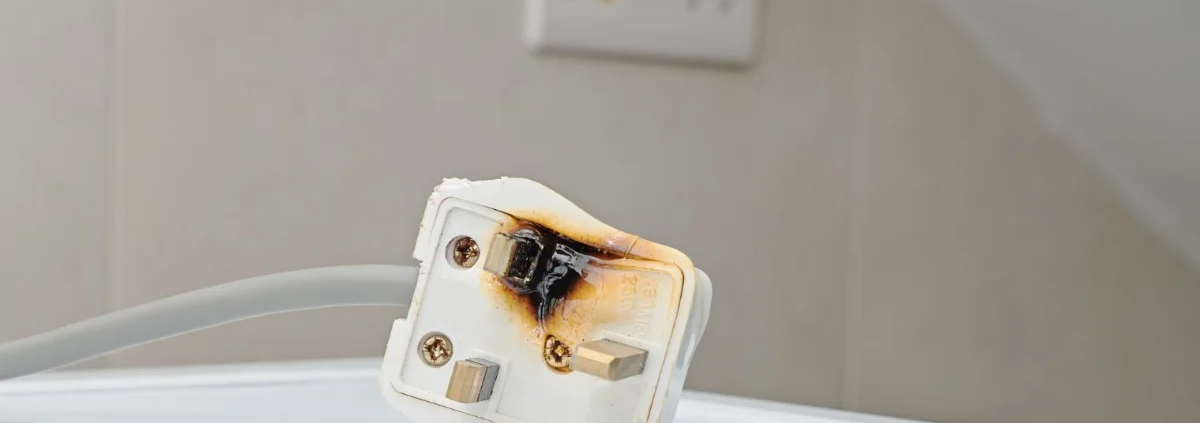A Guide to Preventing Electrical Fires and Handling Emergencies
As an emergency electrician, I’ve seen my fair share of electrical mishaps that could have been easily prevented with a little know-how. That’s why I’m here to share some tips on how to keep your home safe by preventing electrical fires and what to do in the case of an electrical fire.
Understanding Electrical Fires
Top Causes of Electrical Fires
First things first, let’s talk about what can cause those frightening electrical fires.
1. Outdated wiring
The most common culprit of electrical fires is faulty wiring. This is especially true in older homes where the wiring may be outdated or worn down. This is because they are simply not designed to keep up with the modern load that we all want and need! Unfortunately, many of us don’t think about the condition of their appliances or home wiring.
2. Overloading circuits
When too many appliances are plugged in, the circuit’s capacity may be exceeded. This simply means that demand is outweighing supply, and when this happens it can cause a single outlet (socket) to overheat or spark which could lead to a fire. I went to do a condition report at a property recently and noted that the owner was using an extension cable to provide power to her washing machine and tumble dryer. While extension cords are safe to use with smaller – less power hungry appliances – like charger, monitors and printers, larger more powerful appliances should not be powered by extension leads.
3. Older appliances
Older appliances are more likely to have damaged, frayed or loose cords or wiring. Not only can this cause fires but you’re also more likely to get an electric shock from them if the wiring isn’t in top condition. Plus, since older appliances don’t adhere to modern safety standards they are more likely to be using more flammable materials, outdated wiring, inappropriate wattage and may lack in-bult safety mechanisms that exist in modern appliances.
4. Faulty outlets, sockets and switches
Out-dated and faulty sockets, outlets or switches can be a huge problem. Over time the wiring can become faulty or loosen. Another culprit that I see regularly is really shoddy workmanship. Some of the wiring we have seen would never be signed off or deemed safe. When wires are loose or worn this can lead to faulty connections. When this happens the resistance increases causing overheating which can then lead to fires.
5. Damage from water leaks
As most of us will know electricity and water don’t mix. But perhaps you’re thinking ‘how can water cause an electrical fire?’ I went to a property recently where the owners were complaining about a socket not working properly. On my initial observation I noticed a lot of water damage on the wall near to the socket. On further examination I realised that water had been leaking into the socket causing some of the connections to corrode. This was a close call! If they had continued trying to use the socket it could have easily caused strain on the connections which would have resulted in overheating.
6. DIY wiring
Electrics is not something you should dabble in if you don’t know what you’re doing. Even the most savvy DIYers can get things wrong. We recently visited a man who’s electric heater had stopped working. When he turned it on his entire house would trip. Having learned that he had wired it himself we suspected that it could be the culprit. When we removed the front plate we realised that the insulation on the wires had scrapped off because there wasn’t quite enough in the back box itself. The wire for the heater was therefore fully exposed and eventually came into contact with the metal back plate. This then led to overheating which blew out and caused the appliance to stop working. The fault detected on the circuit meant that the whole house would lose power.
Common Signs and Symptoms of Electrical Fires
Spotting the warning signs of an impending electrical fire is crucial for prevention. The main warning signs include:
- Flickering lights – do your lights flicker for no apparent reason?
- Burning smell. Electrical fires smell different. They are acrid, toxic smelling because it’s often wires and plastic that is being scorched and burned.
- Buzzing sounds especially from sockets is a clear sing that all is not well.
- Heat can also indicate that an appliance socket or switch needs some professional attention.
If you notice any of these red flags, it’s time to take action and call an emergency electrician before disaster strikes.
Importance of Early Detection
Early detection can literally be a lifesaver when it comes to electrical fires. That’s why having regular and comprehensive electrical audits is essential (we’ll cover this shortly. ) We also recommend have smoke detector throughout your house. While this isn’t really a preventative measure – it will alert you if a fire breaks out, giving you precious time to escape safely.
How to Prevent Electrical Fires
Regular inspection of electrical wiring
Now, let’s get proactive about preventing electrical fires. One of the best ways to do this is by regularly inspecting your home’s electrical wiring and the appliances you’re using. Look out for any signs of wear and tear, such as frayed cords or exposed wires.
Proper use of electrical appliances
We all love our gadgets and gizmos, but overloading circuits with too many of them can spell trouble. To avoid this, make sure to spread out your electrical load and unplug any appliances that aren’t in use. And when in doubt, talk to your electrician about surge protectors to keep your devices safe from power surges. When we upgrade consumer units at properties we now fit surge protectors as standards to ensure that your appliances are kept safe from power surges, power cuts and lightning strikes.
Maintenance of electrical systems
As they say, an ounce of prevention is worth a pound of cure. That’s why it’s so important to invest in regular maintenance for your home’s electrical systems. Consider hiring a professional electrician to inspect your wiring and outlets, especially if you live in an older property. Trust me, it’s a small price to pay for peace of mind. At heritage electrical we carry out comprehensive Electrical Installation Condition Reports (EICR). Also known as condition reports, they highlight any potential hazards and it’s recommended to have one every 10 years. They are the best method for preventing electrical fires.
In 2020 the government introduced new legislation which requires private landlords to get an EICR done every 5 years. And depending on the outcome of the report remedial work needs to be booked in within 28 days or you could face a fine of up to 30k. The rules are different for different buildings and their ownership and usage, so make sure you check out the law and recommendations for your specific requirements. Remember, if you have an electrical fire and don’t have a recent EICR, your insurance could be void with out it!
For private homeowners thinking of taking on older properties we’d recommend an immediate EICR. Carry out the necessary upgrades and this will make all the difference. A lot of electrical fires that we’re called out to are a result of old wiring. A condition report will give you a clear idea of what needs doing.
Condition reports are not a formality so don’t opt for the cheapest provider. You should aim to get a supplier in that specialises in condition reports or has proof and evidence that they do things comprehensively. It might be more expensive but we’d always opt for an electrician that is thorough, comprehensive and independent.
RCD /RCBO Trip Switches and Circuit Breakers.
Modern switch boards (consumer units) will have RCD/RCBOs. They include a little test button on them which can be pushed to check that everything is working properly. Push the test button to make sure it is tripping. This can be done by the home owner and we recommend doing this quarterly. If you’re consumer unit doesn’t include RCD / RCBOs then you will need to upgrade your consumer unit asap.

Importance of Smoke Detectors
Ah, the humble smoke detector – a true hero in the fight against electrical fires. Make sure you have these little lifesavers installed on every level of your home. And don’t forget to test them regularly to ensure they’re in working order.
Steps to Take in Case of Electrical Fire
Okay, let’s talk worst-case scenario: you come home to find smoke billowing from an outlet or appliance. What do you do? First things first, don’t panic. Your safety is the number one priority. If it’s safe to do so, switch off the power at the main breaker and call emergency services immediately. And remember, never try to extinguish an electrical fire with water – it’ll only make things worse.
Equip your home with an emergency kit
It’s always a good idea to be prepared for the unexpected. That’s why I recommend putting together an emergency kit stocked with essentials like torches, batteries, a first aid kit, and a fire extinguisher rated for electrical fires. These have a black label and use CO2 to extinguish electrical fires. Keep it in a readily accessible location so you can grab it and go in a hurry.
Implement your prevention strategy today!
Phew, we’ve covered a lot! But hopefully, you’re feeling more confident about keeping your home safe from electrical fires and knowing what to do in case of an electrical emergency. Remember, a little prevention goes a long way when it comes to protecting your family and property. The very best way to stay safe is to get a Electrical Installation Condition Report every 10 years. This will check everything from your fuse box, sockets and switches and could ensure that your insurance stays intact in the event of a fire. If you ever have any questions or need assistance, don’t hesitate to reach out to your friendly local emergency electrician – that’s me! Stay safe out there, folks.






Leave a Reply
Want to join the discussion?Feel free to contribute!